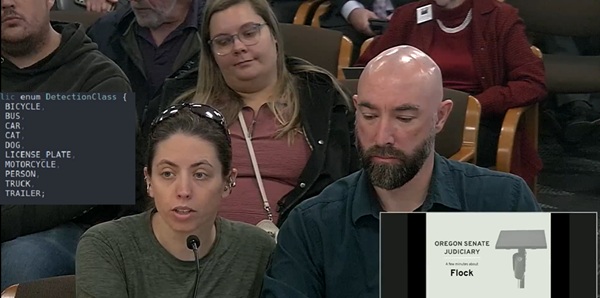Public: Protect us from ICE, Flock, Amazon
11 min read
Presenter: After a surge in ICE activity in the area, public comments on Nov. 24 ask Eugene to take down its Flock surveillance cameras. Glenn O.:
Glenn O.: This last week, we’ve had countless abductions–over 20 people taken from Springfield, Eugene area. In the last two weeks, I think we’re over like 30 or 40. And it’s just so egregious that we haven’t had anything, like, to be done about it. You know, there’s just people getting taken.
[00:00:30] Presenter: William Schwall:
[00:00:31] William Schwall: I have a question for you, and it is not entirely rhetorical, even though I don’t expect a comprehensive reply tonight. But I will wait.
[00:00:43] My question is: What are you as representatives of our city doing to keep us safe? We have armed gangs in the street, wearing masks and disappearing people. These are not arrests. These are abductions.
[00:00:59] The tamale lady in a nice peaceful South Eugene the other day, and people were calling, saying, ‘Does anybody know who she was?’ They took her away and left her stuff on the sidewalk.
[00:01:13] In my own neighborhood, I saw a really shiny black SUV with no license plates. I wonder how long I could drive around with no license plates before I got pulled over.
[00:01:24] What is our city doing to keep us safe? Maybe we need to give it some thought, come up with some new ideas. You’ve got my email. You can make public statements.
[00:01:34] The Police Department badges say ‘to serve and protect.’ And your residents need protection right now. Thank you.
[00:01:44] Presenter: With a resolution approved by the board of SHiNA–the Southwest Hills Neighborhood Association–Ralph Liam McDonald:
[00:01:50] Ralph Liam McDonald: Whereas the Oregon Constitution is widely regarded as providing protections above and beyond the federal U.S. Constitution for citizen privacy and for prohibiting government search intrusion not authorized by court order, therefore be it resolved that the SHiNA Board (1) extends our thank you to the Eugene City Council for the current suspension of active surveillance through the Flock camera system. (2), SHiNA requests that the city of Eugene through the City Council solicit an opinion from the Oregon Attorney General regarding the legality of Flock surveillance under the specific relevant sections of the Oregon Constitution.
[00:02:37] Kristina Beggen: I’m Kristina, and I am here tonight to ask that you do everything in your power to prevent the occupation of our city by two pernicious and powerful corporations, Amazon and Flock security. The Flock cameras conduct dragnet surveillance that violates our rights to privacy. You have heard many times now about how Flock collaborates with iCE to facilitate the abduction of immigrants, and it’s fundamentally insecure in its data storage practices, willfully exposing and providing our locations to agencies that have the means and motive to harm us. Amazon and Flock are connected.
[00:03:11] Presenter: Shelly Devine:
[00:03:12] Shelly Devine: I just wanted to say on the reduction in funding for the housing and poverty program: That’s directly correlated to the federal crime syndicate regime’s agenda to criminalize the poor and unhoused.
[00:03:24] So this is the system by which these folks will be fed into the system of mass incarceration. And the corporations that build and fill the detention centers are in direct league with the likes of ICE, Flock, and Amazon. We say no Flocking way to any of it.
[00:03:42] We insist you impeach, convict, and remove all ties to Flock and Amazon. So we don’t get to sit up here and talk about protecting our immigrant neighbors on one hand while also allowing an Amazon warehouse to set up shop on the other.
[00:03:59] Eugene espouses to value the dignity and worth of all human beings. And Amazon and Flock, by definition and practice, do not. The fact is, Amazon Web Services is a prime driver of Immigration and Customs Enforcement’s incarceration and deportation regime by providing ICE with a host of data storage services.
[00:04:23] Amazon has built a revolving door with the U.S. government to entrench Silicon Valley’s role in expanding the acceleration of ICE’s surveillance, data accumulation, arrest, imprisonment, and deportation of immigrants, and anyone they don’t like for that matter.
[00:04:40] ICE cannot wage its war against immigrants without the critical infrastructure support provided by tech corporations like Amazon.
[00:04:49] And Amazon gets richer from ICE’s importation machine by further entrenching the cloud-industrial complex, a lucrative public-private partnership between industry, lobbyists, key federal legislators, tech executives, and former tech executives turned government officials and vice versa.
[00:05:10] It’s a mutually beneficial operation of corruption and exploitation at the expense of people, namely their workers and U .S. taxpayers…
[00:05:18] Amazon is also enriched by supporting the development of systems that allow the U .S. government to target and punish en masse those which the fascist oligarch Trump regime has deemed undesirable.
[00:05:30] Presenter: Speaking before and after the public comments, Councilor Matt Keating:
[00:05:34] Councilor Matt Keating: Mayor, just a few days ago, I reached out to you and to City Manager, underscoring how aghast I was, and community members in South Eugene, reporting an abduction.
[00:05:49] And I appreciate the community coming out so strongly tonight, pointing to the atrocities, to the apprehension, and to the unrest in our community.
[00:06:02] I’m on a road trip back to Eugene from the National League of Cities Conference that I attended in Salt Lake City.
And while I was in Salt Lake, I worked with partners from Hood River and from state of Washington and alongside the mayor of Ashland to try and advance a resolution that would address these atrocities more readily and do what little we can to strengthen our sanctuary city, Oregon sanctuary state laws.
[00:06:35] There are movements afoot in our legislature. I want to thank (Oregon Senate Majority) Leader Kayse Jama for advancing the conversation around what the state can do in regards to the aforementioned abductions. And I encourage you to follow the Judiciary Committee in regards to the LPR or Flock camera conversation.
[00:06:57] Presenter: Here’s that Oregon state Senate Judiciary Committee meeting from Nov. 17, featuring several familiar voices.
[00:07:04] Chris Skinner (Eugene Police, chief): My name is Chris Skinner. I’m the chief of police here in the city of Eugene. I think one of the challenges that we have moving forward is that many of the discussions are starting to conflate the issue of ALPR with a specific vendor, and I think we need to separate those out because the technology as an industry-standard practice is a crimefighting tool that all of us need in the state of Oregon, and we’ve seen it certainly affect our livability and our safety here in the city of Eugene.
[00:07:34] We had our program for just few short months before we suspended it at the request of our city council, pending some further discussions and maybe a more enhanced contract with our specific vendor. In that short period of time, we saw as many as 94 incidents where we were able to make arrests.
[00:07:51] Sixty-three to 64 of those were felony arrests, here in Eugene. Many of those cases in the early stages were homicide suspects that were captured on behalf of the sheriff’s office, as well as sexual assault suspects and domestic violence suspects caught.
[00:08:08] Upwards of 70% of all of our criminal activity has a vehicle description attached and so this type of technology is really important as a crimefighting tool.
[00:08:19] Probably the most profound example of what happened here in Eugene is our Asian American community members were subject of a burglary ring and very organized, well-financed burglary ring. Over the last couple of years, we saw as many as 24 different burglaries that were targeting our Asian American community members.
[00:08:37] We made some arrests back in 2024, only to find that we had a new group in town that were targeting our Asian Americans and if not for ALPR with a very grainy photo of a vehicle, we would have not been able to identify that vehicle and subsequent license plate that would, with the help of the Eugene Police Department, Patrol Division, Street Crimes, and our Detective Unit vector in and find the location of the vehicle staying at a local Airbnb as their base of operations.
[00:09:08] We were able to surveil that particular vehicle, watch them drive through our Oregon communities up and down the I-5 corridor, such as Albany, Corvallis, and up to Salem where they committed another burglary of another Asian American family up there.
[00:09:22] We followed them back and were able to ascertain that they had brought some of the stolen material back with them to Eugene. We wrote the appropriate search warrants and we were able to arrest seven individuals and actually break open this organized ring that were targeting our Asian American community members.
[00:09:39] None of that would’ve happened if we would’ve not had ALPR at the right place at the right moment. And with that very grainy photo of a vehicle description, we were able to ascertain the license plate, which was key in us being able to put that investigation together and will be key as we prosecute these cases moving forward.
[00:09:59] We have full support of our district attorney, Chris Parosa, down here as ALPR is seen as a very vital tool for prosecution. And we’re hopeful that we’re able to move forward, as we look to the short session in 2026 and beyond, move forward with having just and reliable controls around ALPR, but having that technology here for Oregon communities and Oregon law enforcement as a critical crime fighting tool.
[00:10:25] Presenter: Representatives also spoke for the group Eyes Off Eugene Springfield:
[00:10:29] Ky Fireside: My name is Ky Fireside.
[00:10:31] Flock is most of all a highly networked surveillance system installed across the U.S. They’re growing rapidly and are up to about 100,000 devices. This number is an estimate based on data compiled from many sources because it’s difficult to get complete information on installations.
[00:10:49] In Oregon, most of these are installed along the I-5 corridor and urban areas, but there are Flock installations in many smaller towns too. Each camera uploads data directly to Flock’s infrastructure hosted on Amazon Web Services (AWS). Law enforcement get a web-based user interface that allows them to request some of that data.
[00:11:12] This architecture allows Flock to provide access directly to third parties at any time without the knowledge or consent of the law enforcement customers.
[00:11:23] Flock’s cameras collect far more than just license plates. Source code that we have extracted very clearly shows the different categories of objects that the cameras are programmed to recognize and upload, including people and bicycles.
[00:11:37] Flock themselves proudly advertise the ability to search for things that are not vehicles, including people using descriptions of their clothing, and police departments have access to some of these other nonvehicle images as well.
[00:11:52] Law enforcement agencies have the ability to share this information with third parties. There is extensive data sharing built into Flock. The vast amount of data collected combined with a powerful search interface and a lot of built-in data sharing, create a lot of opportunities for abuse.
[00:12:09] One particular type of abuse is Flock sharing data with third parties without the knowledge or consent of the law enforcement customers.
[00:12:18] The groundwork for Flock’s cooperation with federal agencies was laid early in their development. They had MOUs (memoranda of understanding) with fusion centers by October of 2020.
In June of this year, in response to investigations of search audit logs, Flock said they removed direct access to Flock data for federal agencies. However, in August, investigators found additional evidence in search audit data that federal agencies had another kind of direct access to Flock systems at individual cities.
[00:12:48] Flock set up accounts for Customs and Border Protection agents who were able to request direct access to the Flock systems in individual cities. Because Flock’s interface incentivizes data sharing, many cities accepted the requests without knowing who they were sharing data with. Again, these agencies were not aware of this data sharing.
[00:13:11] Flock described this as a pilot program and subsequently discontinued it in August in response to national reporting. Flock framed this as a local issue, but they created a system that allowed federal agencies to breach local contracts without the knowledge of the cities or departments that had paid for the system.
[00:13:30] In October of this year, investigations by (U.S. Sen.) Ron Wyden’s office uncovered a greater level of federal access to Flock than was previously known. This was enabled through a different mechanism than the cases over the summer. The mechanism is the national lookup tool, which allows police agencies to search Flock systems across the country.
[00:13:50] Agencies have to provide national access in order to gain national access. Flock then gave federal agents direct access to this same feature.
[00:14:00] The University of Washington recently published a comprehensive report on Flock’s repeated data sharing with federal agencies. Their findings matched those of journalists, Ron Wyman’s office, and independent organizations like ours.
[00:14:13] Presenter: Sen. James Manning:
[00:14:15] Sen. James Manning: An incident occurred in a state where the chief of police—not here, not in Oregon—the chief of police was using the Flock system to track his former girlfriend and her husband, and he was following them. a record number of times times. I’m concerned about the potential abuse of that.
[00:14:37] Presenter: From EyesOffEugene.org, Rob Sheldon:
[00:14:40] Rob Sheldon: Just as an example of one of the challenges surrounding this particular system, Oregon police agencies out of the Medford area were found to have been emailing Flock request data back and forth with federal agents for immigration purposes, clearly in violation of state policies. And up until just recently, Eugene was sharing direct access with their systems with (Medford Police Department).
[00:15:04] Presenter: Judiciary Chair Sen. Floyd Prozanski:
[00:15:07] Sen. Floyd Prozanski: Let me just start and make sure the Committee knows that the plan here was to get information out, kind of just a starting point. I’m calling it the springboard for a work group.
[00:15:15] There will be a work group that will be assimilating after the Legislative Days to actually work through some of the issues that have been brought up today and other issues that have not had time, so we can in fact look forward to what legislation should come forward in 2026.
[00:15:32] I do understand… concerns that there is not a misuse of this information data source. I understand that in the state of Washington, there’s been a recent decision determining that this type of information is being deemed a public record.
[00:15:47] And I think this is one of the areas that since we are wanting to safeguard individuals’ public privacy and safety, that we need to be looking at potentially some type of exclusion from our public records law, even though Charlie Fisher (of the Sunshine Committee) told us that we should not, we will be working this issue and we will be bringing it back up, probably in January.
[00:16:06] Presenter: Eugene suddenly finds itself facing ICE, Flock and Amazon, all at the same time. With the outgoing city manager retiring next month, the question is not only how the city will respond, but when.







